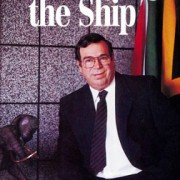Steadying the Ship
South Africa’s new Government of National Unity moved quickly to re-appoint Chris Stals for a five- year term as governor of the South African Reserve Bank. His re-appointment underlined government’s determination to win investor confidence by retaining the services of a tough central banker renowned for his dedication to fiscal discipline. Stals were first appointed governor in the twilight days of the old National Party government. His appointment followed the death of the widely respected Dr Gerhard de Kock. Holding interest rates relatively high when many economists we’re calling for an easing in monetary policy, Stals may not have won too many new friends but he has certainly won respect for his determination. Considerable attention is now being focused on whether he will be able to maintain his stance under a new government which is committed to increased social spending on programs to uplift communities disadvantaged during the apartheid era. Stals should know what he is up against. From his years as director general of the Finance department prior to becoming governor, Stals is all too well aware of spending pressures from government departments.
Simon Segal spoke to him on future prospects.
When other emerging economies present attractive investment opportunities, why should foreign investors be interested in South Africa!
Now is a good time. There are plenty of opportunities to benefit from an expanding South African economy and export to Africa through South Africa. Africa cannot compete internationally. South Africa can help. We anticipate GDP growth of 3 to 4 per cent this year and next. Underpinned by expansion in fixed investment, our economic growth now has its own momentum. But to achieve a higher growth rate of, say, 5 per cent requires a net capital inflow of around $1 billion. This will only happen when government’s policies are accepted as credible and responsible.
Are you confident that the new government’s economic policies will help sustain such growth?
In its economic statements so far government has not put a foot wrong. The three-year constitutional transition did the world of good in changing the economic attitudes of the Africa National Congress. Today, privatization is mentioned, no longer nationalization. Good progress towards cabinet coherence has been made at central government level. My re-appointment for a further five years is indicative of consistency and continuity in economic policy.
Yet, foreign direct investment in South Africa is still virtually absent.
There is not much evidence of foreign private sector long-term investment beyond many enquiries and the buying of existing assets. Foreigners seem to be waiting to be presented with a list of projects. But South Africa is a free market where firms ought to conduct their own research and investigations.
How disruptive is the resignation of Finance Minister Derek Keys?
The way it was handled had a negative effect on the financial markets. But this was short-lived once the new minister confirmed his aims for fiscal policy are the same as Keys’s.
A major headache is the precarious foreign reserve position, now worth less than the value of one month’s imports.
The net capital outflow over the past 15 months has been $6 billion of which $1 billion was in the first four months of this year. But since the election in April we have been encouraged by the return to South Africa of short-term money linked to trade. Now, outflows are matching inflows. This has helped in managing our foreign reserves. Long-term funds will flow into the country once an international credit rating has been obtained, probably in September. It will be better to start with a low minimum investment rating. Portfolio investment in South African equities and bonds is still volatile, unpredictable and vulnerable to political developments.
With SA vastly under borrowed, how much will the country raise offshore this year?
An amount of R1.6 billion is provided in the Budget. But no decision has been taken about how much or where the money will be raised. It depends on our rating and on market conditions. South Africa is under borrowed in terms of its $16 billion foreign debt, some 14 per cent of our GDP. But it must be remembered that there is a financial Rand pool of $15 billion owed to non-residents that is at this stage not convertible. So it is an issue.
Will South Africa go to the IMF and World Bank?
With economic growth we anticipate a surge in imports over 1995 and 1996. From historical experience imports can expand 30 to 40 percent. This means we will have to run a current account deficit. Under such circumstances the IMF provides assistance. But its conditions are stiff and serious. A budget deficit that amounts to 6 to 7 per cent of GDP, as at present, is not consistent with IMF policies and conditions. The World Bank is waiting for South Africa to submit projects. It is interested in assisting in the areas of housing, education, urbanization and development of small business. In the end, aid and donations are useful for social upliftment but cannot support long-term economic growth.
What has changed for the Bank under the new government?
In some ways our independence is now more protected than ever. The big changes are in fiscal policy through the reconstruction and development programme (RDP), not monetary policy. RDP demands can, however, make monetary policy more difficult to manage.
Are you worried about heavy fiscal demands presented by the RDP?
All over the world, needs exceed resources. This is what economics is about. Social upliftrnent is important. The challenge is to satisfy as many needs as possible within the country’s restraints.
South Africa, The Journal of Trade, Industry and Investment
Publisher, David Altman
Writer, Simon Segal



